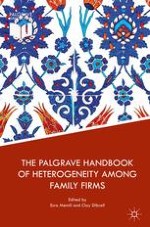2019 | OriginalPaper | Buchkapitel
3. The Most Influential Family Business Articles from 2006 to 2013 Using Five Theoretical Perspectives
verfasst von : Dustin L. Odom, Erick P. C. Chang, James J. Chrisman, Pramodita Sharma, Lloyd Steier
Erschienen in: The Palgrave Handbook of Heterogeneity among Family Firms
Verlag: Springer International Publishing
Aktivieren Sie unsere intelligente Suche, um passende Fachinhalte oder Patente zu finden.
Wählen Sie Textabschnitte aus um mit Künstlicher Intelligenz passenden Patente zu finden. powered by
Markieren Sie Textabschnitte, um KI-gestützt weitere passende Inhalte zu finden. powered by
